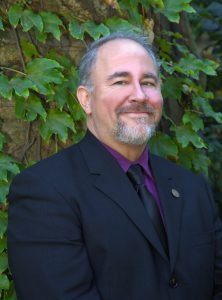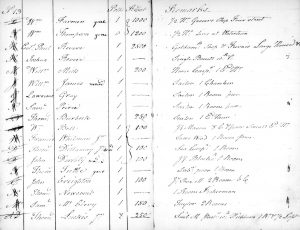 A few years ago, I was about to take my second academic sabbatical at NEHGS. My first sabbatical produced much of the research needed for the Vital Records of Stoughton, Massachusetts, to the end of the year 1850, published by the Massachusetts Society of Mayflower Descendants in 2008. For my second sabbatical I wanted to select a project that would benefit genealogists and historians alike. I had a conversation with our President D. Brenton Simons, and he made me aware of a little-known manuscript of Boston records at the Rare Book Department of the Boston Public Library. These fragile books contain the “Taking Books” (later renamed Valuation Books) for the town of Boston from the early 1780s through 1822.
Sadly, the Boston “Taking Books” compiled before 1780 were destroyed by fire, according to the finding aid at the Rare Book Department. The remainder of the “Taking Books” – from 1823 to 1940 – are located at the Boston City Archives in West Roxbury, Massachusetts.
A few years ago, I was about to take my second academic sabbatical at NEHGS. My first sabbatical produced much of the research needed for the Vital Records of Stoughton, Massachusetts, to the end of the year 1850, published by the Massachusetts Society of Mayflower Descendants in 2008. For my second sabbatical I wanted to select a project that would benefit genealogists and historians alike. I had a conversation with our President D. Brenton Simons, and he made me aware of a little-known manuscript of Boston records at the Rare Book Department of the Boston Public Library. These fragile books contain the “Taking Books” (later renamed Valuation Books) for the town of Boston from the early 1780s through 1822.
Sadly, the Boston “Taking Books” compiled before 1780 were destroyed by fire, according to the finding aid at the Rare Book Department. The remainder of the “Taking Books” – from 1823 to 1940 – are located at the Boston City Archives in West Roxbury, Massachusetts.
I assessed that the vast number of books available in the Rare Book Department collection could not be transcribed during the time of my three-month sabbatical. I decided that the most relevant set of books from this series would be those for the year 1800.
The taking books give an actual appraisal of Boston residents and the taxes and polls they were assessed.
There was once an 1800 Federal Census for the town of Boston (incorporated as the City of Boston on 4 March 1822). By the dawn of the twentieth century, no sign of this 1800 census for Boston survived. This census volume or collection of pages may have been lost in a fire, or accidentally discarded during the nineteenth century. Besides Boston, much of its parent county (Suffolk) is also missing.
The taking books give an actual appraisal of Boston residents and the taxes and polls they were assessed. These books are arranged by ward and street, and then by order of the actual house by house visitation. On occasion additional information can include occupation or employment status; mental or physical disability; whether currently “at Sea”; whether the occupant removed to another location; and, sometimes, race or ethnicity. These books detail the valuation for individuals from all walks of life. Individuals range from Paul Revere the goldsmith to sailors who are renting one room while in port.
For the database I digitized these pages and transcribed the names of the head of household; the ward; and the description of the specific dwelling. These images are searchable now on American Ancestors. You can also browse the images from the 1800 Taking Book for Boston page by page as well.
If you are researching an ancestor from Boston, this small window on the dawn of nineteenth-century Boston may be of interest. I sincerely hope this work serves as a valuable census substitute for Boston for 1800. (You may also wish to consider consulting the 1798 Direct Tax for Massachusetts. The latter is also available on American Ancestors.) The Boston City Directory in many cases does not list everyone that the taking records listed. If you wish to consult a copy of the published 1800 Boston city directory you can do so online at the Boston Athenaeum.
Share this:
.jpg)
About David Allen Lambert
David Allen Lambert has been on the staff of American Ancestors since 1993 and is the organization’s Chief Genealogist. David is an internationally recognized speaker on the topics of genealogy and history. Lambert has published many articles in the New England Historical and Genealogical Register, the New Hampshire Genealogical Record, Rhode Island Roots, Mayflower Descendant, and American Ancestors magazine. He has authored and or co-authored in the published genealogies presented to David McCullough, Ken Burns, Angela Lansbury, Michael and Kitty Dukakis, Nathaniel Philbrick, Doris Kearns Goodwin, and Boston Mayor Thomas Menino. He has also published eleven books including A Guide to Massachusetts Cemeteries (American Ancestors, 2018), and Vital Records of Stoughton, Massachusetts, to the end of the year 1850 (Massachusetts Society of Mayflower Descendants, 2008). David received his B.A. in History from Northeastern University. David is an elected Fellow of the Massachusetts Historical Society in Boston, Mass., and a life member of the New Hampshire Society of the Cincinnati and the General Society of the War of 1812. David also serves as the tribal genealogist for the Massachusett Tribe at Punkapoag in Massachusetts. Areas of expertise: New England and Atlantic Canadian records of the 17th through 21st century; American and international military records; DNA research; and Native American and African American genealogical research in New England.View all posts by David Allen Lambert →
